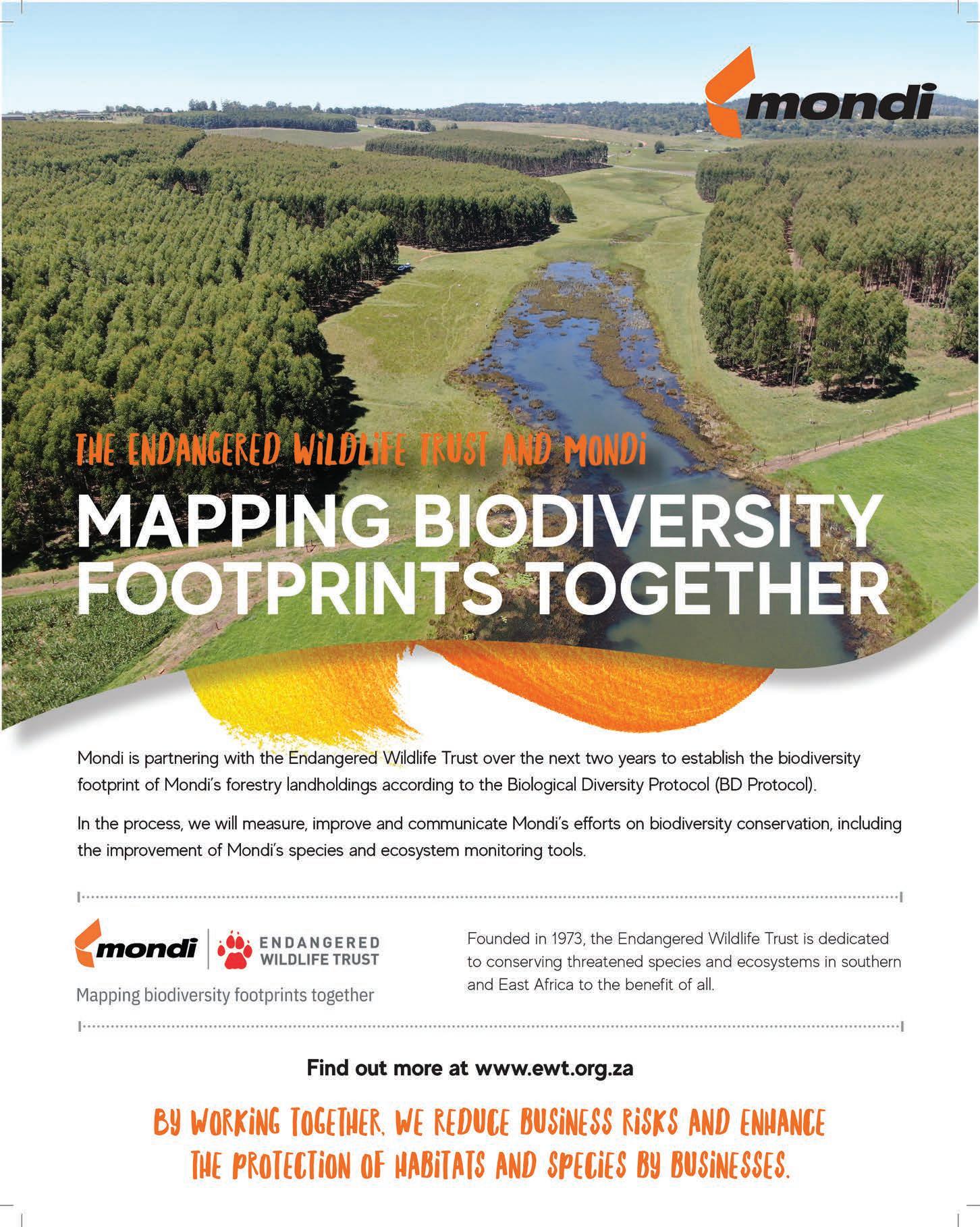


































































































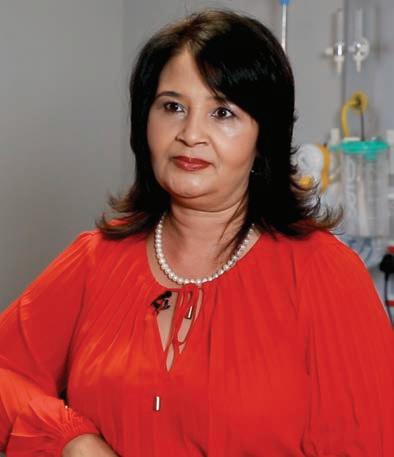
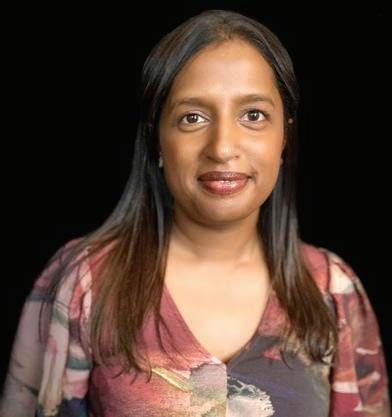
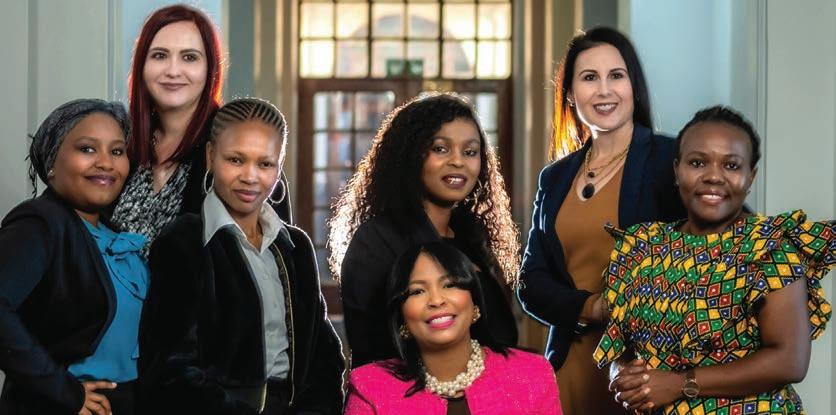




ADVANCING OUR
INSIDE: RIGHTS OF THE LGBTQIA+ COMMUNITY I GENDER-BASED VIOLENCE I ADVANCEMENT OF WOMEN LEADERS IN FINANCE NATIONAL WOMEN’S DAY www.businessmediamags.co.za 9 August 2023
COLLECTIVE RIGHTS
Beverley Palesa Ditsie
Wiedaad Shaik
University of the Free State's women scholars
Merle Victor
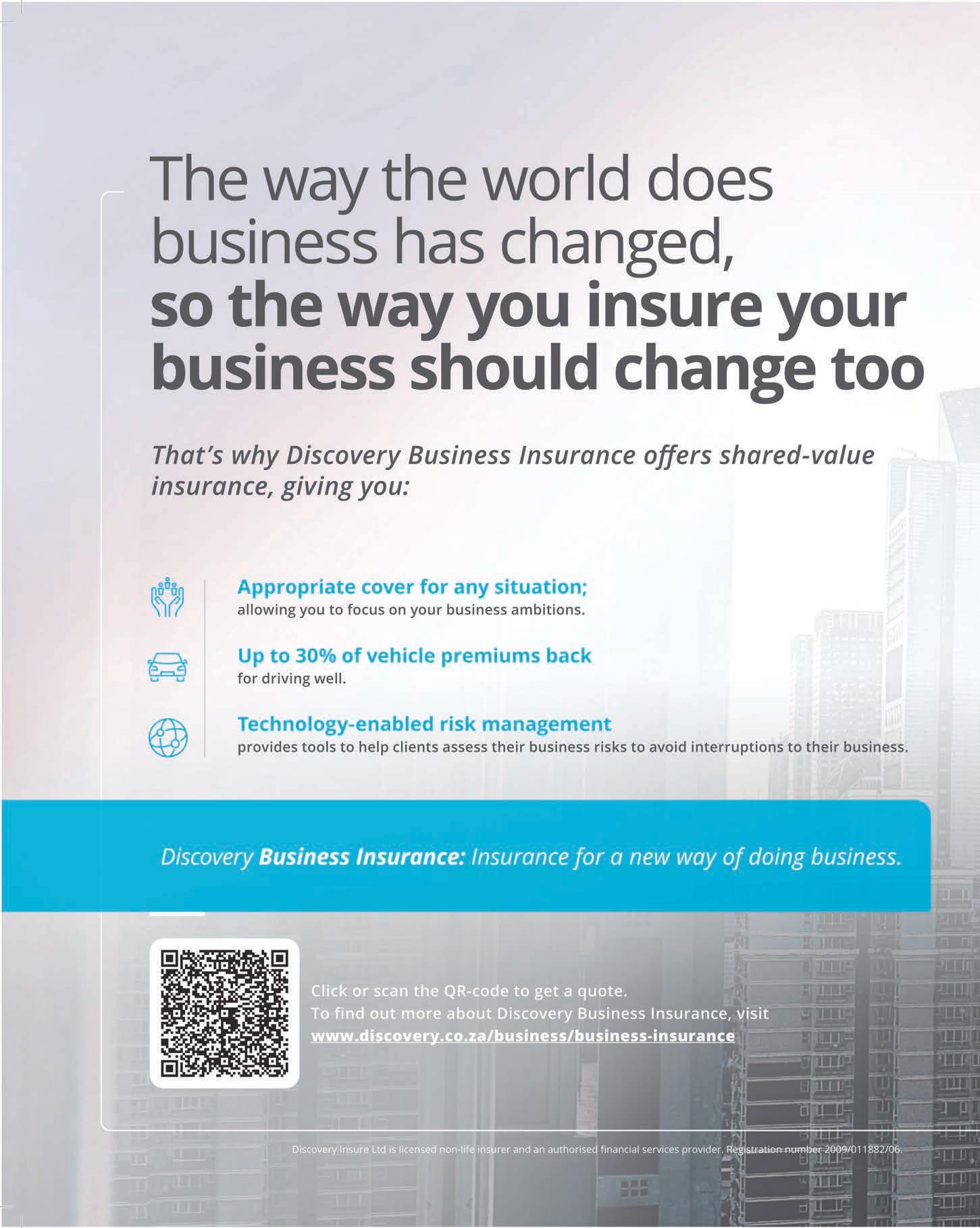

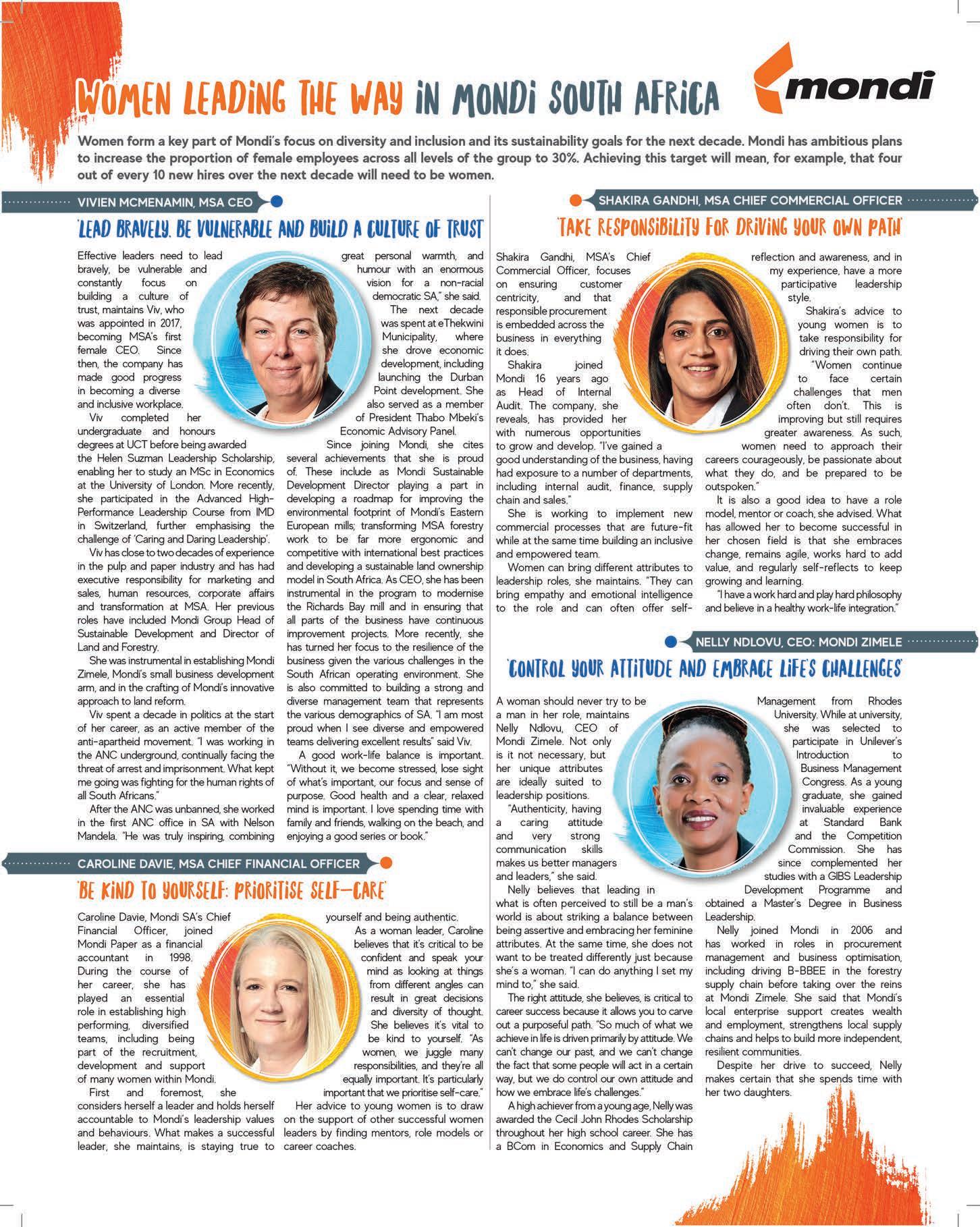
PUBLISHED BY Picasso Headline,













A proud division of Arena Holdings (Pty) Ltd Hill on Empire, 16 Empire Road (cnr Hillside Road), Parktown, Johannesburg, 2193 PO Box 12500, Mill Street, Cape Town, 8010 www.businessmediamags.co.za
EDITORIAL
Content Manager: Raina Julies rainaj@picasso.co.za

Contributors: Prof Ramneek Ahluwalia, Loyiso Masuku, Wiedaad Shaik, Merle Victor
Copy Editor: Brenda Bryden

Content Co-ordinator: Natasha Maneveldt
Digital Editor: Stacey Visser vissers@businessmediamags.co.za
DESIGN
Head of Design: Jayne Macé-Ferguson
Senior Designer: Mfundo Archie Ndzo
Advert Designer: Bulelwa Sotashe
Cover Images: istockphoto.com, supplied
SALES
Project Manager: Jackie Bezuidenhout jacquelineb@picasso.co.za
+27 078 172 7776 | +27 072 430 9392
Sales: Merryl Klein
PRODUCTION
Production Editor: Shamiela Brenner
Advertising Co-ordinator: Shamiela Brenner
Subscriptions and Distribution: Fatima Dramat, fatimad@picasso.co.za
Printer: CTP Printers, Cape Town


MANAGEMENT
Management Accountant: Deidre Musha
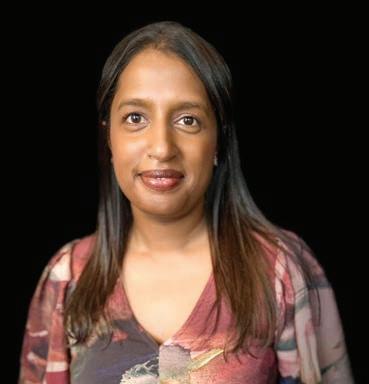
Business Manager: Lodewyk van der Walt




General Manager, Magazines: Jocelyne Bayer
Copyright: Picasso
National Women’s Day is published by Picasso Headline. The opinions expressed are not necessarily those of Picasso Headline. All advertisements/advertorials have been paid for and therefore do not carry any endorsement by the publisher.
ADVANCING OUR RIGHTS
South African National Women’s Day, celebrated on 9 August, pays tribute to the bravery and determination of the women who participated in the 1956 march against imposed pass laws. It is also a reminder of the ongoing struggle for gender equality and women’s rights in South Africa. While women now have equal rights as enshrined in our Constitution, 9 August still plays a vital role in raising awareness about women’s issues, promoting gender equality and honouring the contributions of women to the country’s development.
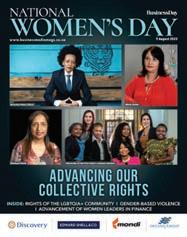
In this issue, we talk about the rights of the LGBTQIA+ community and explore why nursing, as a modern day career, is still a critical career sector. We also tackle issues around gender-based violence and discuss how to attract and retain talent within a professional sector.
Raina Julies
6 LGBTQIA+ RIGHTS
Are the rights of the LGBTQIA+ community protected simply by the Constitution, or do public sector departments have their own inclusivity policies?
7 GENDER-BASED VIOLENCE


The post-schooling education and training sector, as a microcosm of the greater society, is not immune to gender-based violence and its nonlinear root causes.
6

10 NURSING
Nursing is a rapidly evolving field driven by empowered professionals and high-tech medical innovations.
11 BUILDING CAREERS
How to attract, retain and develop women in South Africa’s audit and corporate finance profession.

EDITORIAL COMMENTARY NATIONAL WOMEN’S DAY 3
Headline. No portion of this magazine may be reproduced in any form without written consent of the publisher. The publisher is not responsible for unsolicited material.
Contents 7
11

The Power of Storytelling
Edward Snell is committed to pursuing and unlocking greatness to create a better world. Driving equality is an essential part of this, and when women and minorities share their stories, it helps to break down existing barriers.
By KARIN KRAUSE WESSELS, managing director Edward Snell & Co


Ensuring gender equality across business sectors in South Africa remains an important driver in creating sustainable economic growth within the country. There are many arguments around the changes/solutions required to improve equality for women and other minorities in the workplace, but during this Women’s Month, I want to bring attention to one particular area – the power of storytelling.
Belief and suitable mentorship are two key aspects to breaking down the barriers to entry and advancement in the sector for women, and storytelling has a role to play in both.
In an established system, breaking paradigms can be challenging. However, when women and minorities share their success stories openly and authentically, these stories can create immersive scenarios of a possible future that can engage and inspire others, making their next step feel more achievable. Over time, these stories and these small individual steps create a movement of belief and a tipping point where a new, more inclusive system emerges.
But even with belief, the journey up the career ladder is never linear or without challenges. Sadly, we often do not want to ask for help when the journey gets tough. We have been taught that vulnerability is a weakness. However, in reality, reaching out to mentors and asking for help is not only brave, it is smart. Having a mentor share their experience and their stories of how they circumvented challenges expedites your learning curve.
Hopefully, by having a mentor and experiencing the value thereof, you can become a mentor to others, sharing your experience and stories – so the flywheel of change continues with faster and faster learning curves propelling equality forward.
CHANGE CAN BE EFFECTED
One of my earliest memories centres on a story my father shared that created the belief that women can break glass ceilings.
I was about four or five years old, watching the news with my father. Margaret Thatcher was on television, making a bold speech in front of a room of mostly men. I remember thinking that I had not seen that before – a woman shamelessly commanding a room like that. I turned and asked my father who she was, he said they call her the Iron Lady. As a bit of a history buff, he told me more about her story,
everything she needed to overcome and how she became the fi rst female British prime minister. That story stuck with me and created a greater belief that established systems can be challenged.
Other stories graciously shared by many mentors and coaches throughout my career have continued to challenge my thinking and opened me up to accelerate my growth. And now, being in a position where I can mentor others in the workplace, I am hopefully, through sharing my stories, also playing a small role in liberating them from limiting beliefs.
Our company purpose at Edward Snell is to pursue greatness for good. We want to unlock the greatness of each individual in our company – we believe if we do that and then act as a collective, we can do good in the world. More specifically, we want to leave our industry, our country and our world better than we found it. Driving equality plays an important part in realising our purpose, and we will continue to increase this awareness through our actions and storytelling.
SHARE YOUR STORIES
To change our future, we need to harness the power of storytelling to inspire new possibilities. On Women’s Day and beyond, my greatest wish is for all of us to shout our stories from the rooftops. Bravely share our successes, our failures and how we overcame them. Identify mentees and share our stories and learnings with them. Fill up social media channels with our stories. Share them in printed media and share them on podcasts. Share our stories in the boardroom and share them on the battlefields. To evolve a system, we need to evolve our stories, so be brave, share yours.
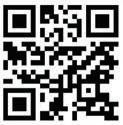
5 NATIONAL WOMEN’S DAY EDWARD SNELL & CO. ADVERTORIAL For more information: 021 506 2600 www.esnell.co.za Scan this QR code to go directly to the Edward Snell & Co website.
Images: Supplied
WHEN WOMEN AND MINORITIES SHARE THEIR SUCCESS STORIES OPENLY AND AUTHENTICALLY, THESE STORIES CAN CREATE IMMERSIVE SCENARIOS OF A POSSIBLE FUTURE THAT CAN ENGAGE AND INSPIRE OTHERS.
Karin Krause Wessels
The rights of the LGBTQIA+ Community








Are the rights of the LGBTQIA+ community protected simply by the Constitution, or do public sector departments have their own inclusivity policies? By LOYISO MASUKU, member of the mayoral committee for Group Corporate and Shared Services at the City of Johannesburg Municipality











stigmatisation and exclusion. To counter this, we should all collaborate with stakeholders and partners in our sectors to promote greater equality and inclusivity for the LGBQTIA+ community.
ARE WE DOING ENOUGH?








As stakeholders in the public sector, are we doing enough to promote the rights of the LGBQTIA+ community within state institutions? Should members of the LGBTQTIA+ community within the public sector rely on the Constitution alone for the protection of their rights, or should the public sector develop and advocate our own inclusivity and equality policies? The public sector can make a big difference if we also pursue the development of our own policies; responding to the realities we face daily.


The City of Johannesburg takes pride in being one of the leading municipalities in the country to advocate for the rights of the LGBTQIA+ community and their inclusion in the workplace.
Our human resources policies are clear that it is illegal to unfairly discriminate against employees or job applicants on the grounds of their sexual orientation in any employment policy or practice, including recruitment, promotion, training, benefits and termination. Employers are required to create a discrimination- and harassment-free workplace that provides equal opportunities for all employees.




In South Africa, Women’s Month is about remembering and honouring the heroics of women who protested against the atrocious pass laws, and the struggle they waged against the patriarchal, classist and racist society.


Their selfless actions nudged us closer to achieving the freedom we enjoy today.








Despite the successes in respect of women, we continue to witness the regrettable violation of human rights of the LGBTQIA+ community.
The City of Johannesburg has a long history of being home to many LGBTQIA+ activists at the forefront of the struggle for inclusivity and equality, including the late larger-thanlife Soweto-born Simon Tseko Nkoli, whose impact and work on the rights of the LGBQTIA+ community was so significant. As the City of Johannesburg, we honoured his memory by renaming a street in Hillbrow after him.


Nkoli was also the founder of the Gay and Lesbian Organisation of the Witwatersrand (GLOW) and the organiser of Johannesburg and Africa’s first gay parade in 1990, a highlight






on the Johannesburg social and cultural calendar. Nkoli and fellow GLOW founder Beverley Palesa Ditsie had a major influence on how South Africa’s Constitution protects, defends and embraces the rights of the LGBTQIA+ community.
Through their efforts, South Africa became one of the first countries worldwide to outlaw discrimination based on gender and sexual orientation. Our Constitution prohibits unfair discrimination based on sexual orientation in the workplace. The Employment Equity Act (EEA) also requires employers to take steps to promote equality in the workplace and deems unfair discrimination unlawful.


DISCRIMINATION REMAINS AN ISSUE













The past three decades have seen numerous progressive gains for the LGBQTIA+ community in South Africa, including the legalisation of same-sex marriages in 2006 and the provision of transgender healthcare services, among others. However, the LGBTQIA+ community remains a vulnerable group, facing daily discrimination,
The city’s transformation mandate is to ensure that our workplace comprises diverse employees irrespective of their sexual orientation or sexual preference as well ensuring that there is diversity and implementation of inclusion in the workplace through education and awareness creation.
We are currently working on a Diversity and Inclusion (D&I) Awareness programme in partnership with the Commission for Gender Equality (CGE) to create a tolerant and conducive work environment as well as promote social cohesion among the city’s employees. This awareness programme will also bridge the gap around the lack of education on and understanding and tolerance of the LGBQTIA+ community.
The city is also working on a Group Anti-Harassment Policy Framework to institutionalise our fi ght against various forms of harassment, including gender-based harassment or harassment relating to sexual orientation. Further, the talent acquisition sub-directorate is currently training offi cials, who are eligible, to sit on the recruitment panels for interview etiquette, including gender sensitivity. The aim is to address subtle exclusion and side-lining of candidates due to sexual orientation or gender identity.
We still need to do more to raise public awareness about the rights of the LGBQTIA+ community and to normalise acceptance and inclusivity.
6 NATIONAL WOMEN’S DAY LGBTQIA+ RIGHTS
IMAGE: SUPPLIED
THE CITY’S TRANSFORMATION MANDATE IS TO ENSURE THAT OUR WORKPLACE COMPRISES DIVERSE EMPLOYEES IRRESPECTIVE OF THEIR SEXUAL ORIENTATION OR SEXUAL PREFERENCE.
GLOW co-founder Beverley Palesa Ditsie had a major influence on how South Africa’s Constitution protects, defends and embraces the rights of the LGBTQIA+ community.
MAKING GENDER-BASED VIOLENCE A COLLECTIVE RESPONSIBILITY IS CRITICAL
PROF RAMNEEK AHLUWALIA , CEO of HIGHER HEALTH, shares how the organisation is taking clues from its response to HIV to eradicate gender-based violence in the post-schooling sector
HIGHER HEALTH, the health, wellness and development agency for the post-schooling education and training sector (PSET), works with South African universities and colleges to implement resources and infrastructure to prevent and respond to all forms of gender-based violence (GBV), including sexual and gender misconduct, assault and rape.
South African women have a 45.6 per cent lifetime risk of experiencing GBV, a rate well above the global average of 35 per cent, as cited by the World Health Organization, and campuses are not exempt from this epidemic. For example, the SA Medical Research Council has found that 10 per cent of reported rapes occur in the PSET sector.

Campus life gives rise to specific forms of GBV, such as sex-for-marks or other benefits, and spying or intruding on students in residences. While women bear the major brunt of GBV, gender-nonconforming individuals are also frequently targeted.
This makes GBV a complex mental and physical threat that inevitably degrades academic efforts and puts the brakes on the dreams and aspirations of young people.
HIGHER HEALTH’s current response encompasses assisting the institutions to implement policies and initiatives to ensure safer campuses and protect women, students and staff from GBV. For the year, more than 60 000 students and staff self-administered a GBV risk assessment tool that draws their
attention to factors and behaviours that increases their risk of GBV. Assistance and support were also provided to 5 000 students and staff.
GBV is part of a legacy crisis. Students’ dreams, talent and hard work are often halted due to toxic masculinity. For decades, South African girls and women have endured the brutality of men often known to the victim. The lessons learnt from our successful response to HIV should be implemented in the fight against GBV.
PARALLELS BETWEEN THE GBV AND HIV EPIDEMICS
• Both have co-existed over a lengthy period and have become embedded in our social and cultural fabric.
• Both have been brutal when measured in terms of health and socioeconomic outcomes and affect women more than men.
• GBV and HIV are underpinned by gender biases, stereotypes, discrimination and often violence that increase the risk to women by reducing their agency to protect themselves.
• Bringing these issues into the open challenges cultural constructs that feed into harmful social norms, shifts attitudes and behaviours, unlocks resources and services and saves lives.
STEPS THAT CHANGED THE COURSE OF THE HIV EPIDEMIC
The results in tackling HIV came from sustained, research-driven, evidence-based strategies with clear priorities, diverse yet aligned responses and massive investments into financial, human, social, medical, political and infrastructural resources. Despite incremental advances, we are not yet ready to close the chapter on the South African or global HIV epidemic. However, we are shifting the needle and tracking the gains as measured by reduced mortality and infections and prolonged good health.
APPLYING A SIMILAR APPROACH TO GBV
PSET, as a microcosm of the greater society, is not immune to GBV and its nonlinear root causes. We are poised to apply a similarly deliberate, multifaceted approach to eradicating GBV as we did to HIV. Some key pillars have already been implemented, and others are being prepared for rollout to ensure our actions grow into a national presence and develop in sophistication and results.
The PSET GBV Policy Framework, the protocol on rape, and a code of ethics are facilitating the implementation of interventions – namely, case reporting, disciplinary systems, safeguarding evidence, rape kit provision, psychosocial support services and preventive and survivor-friendly infrastructure.
HIGHER HEALTH’s accredited civic, social and health co-curriculum, covering gender equality/diversity, GBV, mental health and sexual and reproductive health, enrolled about 500 000 students. Over 700 000 students were linked to health, wellness and psychosocial services through the HIGHER HEALTH 24/7 crisis helpline, and some 10 000 trained peer educators make up a more aware and empowered force within the overall student body.
In addition, we are making GBV a collective responsibility. A soon-to-be-launched multistakeholder partnership will mobilise men to co-craft a PSET where perpetrators have nowhere to hide, toxic masculinity becomes an unacceptable social norm, and gender equality, equity, safety and the empowerment of girls and women are promoted.
Resources
HIGHER HEALTH 24/7 toll-free crisis helpline: 0800 36 36 36
GENDER-BASED VIOLENCE NATIONAL WOMEN’S DAY 7
IMAGE: JACOBLUND/ISTOCKPHOTO.COM
WE ARE POISED TO APPLY A SIMILARLY DELIBERATE, MULTIFACETED APPROACH TO ERADICATING GBV AS WE DID TO HIV.


IMPROVING THE DIGNITY OF OUR PEOPLE
Today, nursing is a rapidly evolving field driven by empowered professionals and high-tech medical innovations. It is a career that literally changes lives, writes MERLE
VICTOR , chief nurse officer at Life Healthcare
TECHNOLOGY OPENS UP NEW OPPORTUNITIES
Digital technological innovation has removed many routine admin tasks from nursing, giving nurses more time at the bedside. Electronic devices are now used to monitor and record patient vital signs and to check their progress.
This supports better informed more effective treatment plans and means nurses are more tech-savvy than ever before. Technology has also improved continuing education in nursing. Online, self-paced learning modules are interactive and available whenever the nurse has the opportunity to study.
Modern day nursing has evolved so radically that it now transcends the healthcare sector. A nursing qualification can open doors to a career in the pharmaceutical sector, education technology, the financial sector, health informatics, community care and occupational therapy, to name a few adjacent industries.
If South Africa wants to achieve universal healthcare – as envisaged with the National Health Insurance (NHI) system – we will need adequate nursing resources.
It would make sense to consider addressing South Africa’s youth unemployment challenges by training and deploying nurses in their thousands. Creating more nursing jobs will improve the health of our communities and the dignity of our people.
There is enormous room to expand our country’s complement of nurses. In an Organisation for Economic Co-operation and Development (OECD) comparison of nursing numbers, South Africa ranked last out of 28
countries, with 1 nurse per 1 000 patients, compared to Switzerland with 18.4, Portugal with 7.8 and India with 1.6.
Following recent regulatory changes, nursing training supports three professional designation categories: registered auxiliary nurses, registered general nurses and registered professional nurses and midwives. The predominant route for the registered professional nurse and midwife is a bachelor’s degree in nursing from a South African university. Students need a grade 12 national senior certificate, generally with maths/ maths literacy and life sciences, to be eligible to apply for nursing study.
EXCELLENT CAREER PROSPECTS
Nursing offers a career pathway for further training and specialisation after initial qualification. Midwifery and specialised nursing in critical care, theatre, community, oncology and occupational health are a few possible career routes. Nurses can also become nursing educators at a hospital, university or private training facilities.
There are also many ways to advance a nursing career within the health sector. Within the hospital industry, we have seen staff who began their careers as porters, care workers and ward clerks seize opportunities to study through private higher education institutions such as Life Healthcare’s nursing college. They are now specialist nurses with many entering nurse manager and nurse leadership positions.
Simulation rooms and digital education systems support innovative teaching that integrates theory and practice and improves cognitive thinking. For example, the advanced electronic learning programme at Life Healthcare’s learning centre is conducive to visual and interactive study, employing 3D human anatomy and physiology software for teaching, learning and presenting. New technology can simulate specific patient behaviours or illnesses in a controlled environment, providing a massive boost to healthcare training. Students get much-needed exposure to realistic scenarios where they can practise life-saving skills without adverse consequences. Scenarios include basic and advanced nursing, wound care, labour, delivery and midwifery.
With these training advances, a plethora of new professions are emerging, offering new ways to treat patients and improve their lives. Clinical technologists and dialysis technicians, for instance, have a massive impact on patients’ lives. Nurses can also improve their abilities and marketability by acquiring these skills.

Theatre nurses now work with robotics to assist and guide surgeons during precision operations in areas such as urology and neurology. Opportunities for nursing in the technology space are constantly growing as new innovations are developed.
Nursing is a field making extensive use of technology while retaining its deeply human principles of care and empathy. I encourage any young person with this combination of progressive thinking and human values to consider a career in the field.
Resources:
Life Healthcare’s nursing education college https://www.lifehealthcare.co.za/careers/ education-and-training/

OECD NURSES COMPARISON
10 NATIONAL WOMEN’S DAY NURSING IMAGE: SUPPLIED
Merle Victor
NURSING OFFERS A CAREER PATHWAY FOR FURTHER TRAINING AND SPECIALISATION AFTER INITIAL NURSING QUALIFICATIONS.
Following recent regulatory changes, nursing training supports three professional designation categories: registered auxiliary nurses, registered general nurses and registered professional nurses and midwives.
EMPOWERMENT AND SUSTAINABLE DEVELOPMENT
SAPRO chief talent architect WIEDAAD SHAIK shares her insights on how to attract, retain and develop women in South Africa’s audit and corporate finance profession

Typically, upon completing their articles as junior auditors, accounting graduates in South Africa strive to become Chartered Accountants (CAs(SA)) by successfully passing both board exams. However, a growing trend nowadays sees many audit professionals seeking opportunities outside of audit.
With the profession facing a critical shortage of experienced audit talent, companies must maintain strong connections with their employees, understand their needs and acknowledge their accomplishments. This entails fostering a culture that encourages continuous development and empowers professionals to take ownership of their careers.
ENHANCED APPEAL AND DIVERSE OPPORTUNITIES
When a qualified CA(SA) chooses to transition out of the audit field, it is often because of a strong aspiration to explore opportunities that contribute to personal growth and development. This enables the public and private sectors to create dynamic work experiences that closely align with the professional’s career and life stage through supportive partnerships built on mutual understanding and collaboration.
Introducing the concept of a “rotating work environment” will represent a significant step forward in fostering collaboration, upskilling and expanding the experience of professionals. This approach aims to broaden and diversify specialised capabilities while ensuring high employee engagement levels.
EMBRACING INDIVIDUALITY
By fostering an environment that embraces individual creativity, firms and their clients can benefit from fresh ideas, innovations and opportunities, particularly as the economy shifts towards more sustainable development and finance.
Through this approach, auditors gain the confidence to showcase their individuality and embark on new pathways that transcend traditional thinking. This allows them to leave their mark on the clients they serve and the accounting profession.
Did you know?
By the end of June 2023, the South African Institute of Chartered Accountants had a total of 21 680 women registered as CAs(SA). Of that number, 9 650 are black.
Source: 2023 SAICA Membership Statistics (January to June)
CONNECTED COMMUNITY
It is vital to strengthen and advocate for the future leaders of the audit profession by ensuring they receive support and have access to a support network and community. At SAPRO, we are committed to fostering an inclusive environment that facilitates professional relationships among women. We encourage active participation in organisations such as The South African Institute of Chartered Accountants and the Association for the Advancement of Black Accountants of Southern Africa that provide invaluable platforms for women to engage and interact with peers at similar stages in their careers.
Creating a culture that promotes the advancement of female leaders in the profession involves equipping them to participate in key decision-making processes.
Such connections offer an opportunity to join meaningful networks and communities where knowledge sharing and discussions about collaborative opportunities occur.
NURTURING A CULTURE OF RESPECT FOR PERSONAL TIME
In recent years, the significance of achieving balance has become increasingly apparent. To succeed, the future of work must consider diverse needs and priorities while maintaining high-performance standards. Flexibility is often discussed, but there is no universal solution. Companies must be adaptable and agile, recognising and valuing the individual needs and values of their professionals.
EMPOWERMENT AND EXPOSURE
Creating a culture that promotes the advancement of female leaders in the profession involves equipping them to participate in key decision-making processes. By exposing women to challenges that empower them to gain valuable experience, we help cultivate their confidence in their abilities and foster their overall growth.
In the face of persistent biases, the presence of women in leadership roles has gained increased significance. It is crucial to create opportunities that allow more women in the profession to showcase their strengths, share their voices and apply their skills and talents. By so doing, we lay the foundation for nurturing future leaders within the profession.
*SAPRO is an assurance, tax and advisory consulting firm.
SAPRO’S EMPLOYEE VALUE PROPOSITION
The company’s employee value proposition is built on five pillars:
1. Shared purpose.
2. Elevated growth.
3. Adaptive agility.
4. Connected community.
5. Holistic experiences.
BUILDING CAREERS NATIONAL WOMEN’S DAY 11
Wiedaad Shaik
WE ARE COMMITTED TO FOSTERING AN INCLUSIVE ENVIRONMENT THAT FACILITATES PROFESSIONAL RELATIONSHIPS AMONG WOMEN.
IMAGE: SUPPLIED


